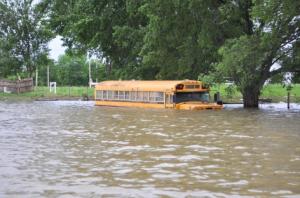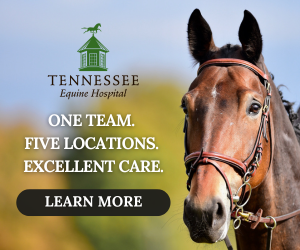By Pam Gamble & Tommy Brannon
In May 2011, Memphis, TN saw the flood of the century as the Mississippi River rose to a height of 48 feet at crest. “By May 10, the river had swelled to six times its normal girth, more than 3 miles (5 km) across at Memphis,” Time reported. Flood gates that had not been used since their manufacture after the great flood of 1937 were assembled. Many homes in low lying areas were inundated, and the area was named a Federal Disaster Area on Tuesday, May 10 by President Obama.
Not only were homeowners and their pets affected by the floods, so were many horse owners. Some of the worst flooding occurred in the area near Hwy. 51 and Watkins Road. Self-service barns K N P stables and T C Stables on Watkins in Frasier were particularly vulnerable because of their location on the flood plain of the Loosahatchie River. Boarders at K N P Stables started early evacuating late April, but the evacuation took longer than anticipated. Since many of the horse owners at this barn do not own trailers, they had to persuade friends to help. Paul Kossik and Ashleigh Wayman helped with trailering and general help. Chrissy Saylor, owner of Carriage Tours of Memphis, made multiple trips with her truck and trailer, hauling horses to her parents land in Millington. K N P Stables had 30 horses to get out of the field. On May 2 the last equine was taken from K N P, a miniature donkey that, until that time, had refused to be caught. The donkey did not seem to understand that the round pen he was in was the last dry spot at his barn and it was disappearing fast!
Dr. Kim Garner, DVM from Big Creek Animal Hospital in Millington rushed several Coggins tests for displaced equines, making it possible to place them in volunteer temporary homes in Tipton County. She also provided temporary boarding for several horses and the donkey, both at no charge.
T C stables had 60 horses on the premises and had more logistical problems getting their horses out. Coordinated efforts among Becky Mueller, UT County Agricultural Extension Agent; Ranger Rick Richardson; and Peggy Hart, members of DART, Disaster Animal Response Team, and SFEA, Shelby Farms Equestrian Alliance, resulted in getting 45 of those horses transported to the Agricenter Show Place Arena stables; the rest found homes elsewhere. Shelby Show Place donated the stall space, which is usually $17 a day, only charging for shavings and the horse owners are responsible for stall cleaning. Unfortunately, some of the horses moved to the Agricenter had been brought with-out their water buckets and other basic necessities. Rick called the T C manager, who had difficulty reaching the multiple owners. T C is a self-help barn, with owners responsible for the care of their horses.
Hay was in short supply at the time of the flooding. The 2001 spring crop had not been baled and most places were out of hay. Many people helped in their own way. Susan Walker offered to sell 50 bales at her cost. Blain Lanier at Harvest Feed offered to sell 200 bales. Mark Norris offered to donate 100 bales, but did not have transportation. Becky Mueller made arrangements to get hay picked up. Wildwood Farms offered to donate turn out pasture.
Rick thanks all the people who offered whatever they had, and hopes they offer again in the future. Peggy Hart coordinated the logistics. She called people with trailers to help transport the horses and had more offers of help than were needed. Beth Watson posted on Facebook for help and the equine community answered. Unidentified good Samaritans showed up with three large horse trailers and transported many of the T C horses to the Agricenter Show Place Arena.
Beth Watson, former boarder at K N P Stables, came to the West Tennessee Hunter Jumper Association Memphis in May II show to raise awareness for other displaced horses. Many mid-south horse people are aware of the horses at the Agricenter Show Place Arena, but Beth was trying to raise awareness of other horses that were evacuated before the “last minute” and their needs. “I have also cleared some space in my storage room for any hay, shavings, etc. and have been collecting contact information for people who haven’t had the benefit of being at Agricenter. The horses evacuated to the Agricenter have been publicized so they are getting help. But many other people who moved their horses before they were just taken at the last minute are scattered and haven’t benefitted from the publicity the horses at Agricenter have received.”
The West Tennessee Hunter Jumper Association responded to the needs of the displaced horses. Led by Beanie Cone, left-over hay and shavings from the Memphis in May horse shows were donated. Beth hopes to represent the displaced horses at the Germantown Charity Horse Show as well.
The needs of the displaced horses will continue for several months. Water will take weeks to recede, and the damage afterwards for many properties will be irreparable. K N P hopes to reopen by the end of June, but they realize this will be a monumental task. The pasture must be tilled and possibly treated in response to tests that have been run for bacteria and parasites.
In May 2011, Memphis, TN saw the flood of the century as the Mississippi River rose to a height of 48 feet at crest. “By May 10, the river had swelled to six times its normal girth, more than 3 miles (5 km) across at Memphis,” Time reported. Flood gates that had not been used since their manufacture after the great flood of 1937 were assembled. Many homes in low lying areas were inundated, and the area was named a Federal Disaster Area on Tuesday, May 10 by President Obama.
Not only were homeowners and their pets affected by the floods, so were many horse owners. Some of the worst flooding occurred in the area near Hwy. 51 and Watkins Road. Self-service barns K N P stables and T C Stables on Watkins in Frasier were particularly vulnerable because of their location on the flood plain of the Loosahatchie River. Boarders at K N P Stables started early evacuating late April, but the evacuation took longer than anticipated. Since many of the horse owners at this barn do not own trailers, they had to persuade friends to help. Paul Kossik and Ashleigh Wayman helped with trailering and general help. Chrissy Saylor, owner of Carriage Tours of Memphis, made multiple trips with her truck and trailer, hauling horses to her parents land in Millington. K N P Stables had 30 horses to get out of the field. On May 2 the last equine was taken from K N P, a miniature donkey that, until that time, had refused to be caught. The donkey did not seem to understand that the round pen he was in was the last dry spot at his barn and it was disappearing fast!
Dr. Kim Garner, DVM from Big Creek Animal Hospital in Millington rushed several Coggins tests for displaced equines, making it possible to place them in volunteer temporary homes in Tipton County. She also provided temporary boarding for several horses and the donkey, both at no charge.
T C stables had 60 horses on the premises and had more logistical problems getting their horses out. Coordinated efforts among Becky Mueller, UT County Agricultural Extension Agent; Ranger Rick Richardson; and Peggy Hart, members of DART, Disaster Animal Response Team, and SFEA, Shelby Farms Equestrian Alliance, resulted in getting 45 of those horses transported to the Agricenter Show Place Arena stables; the rest found homes elsewhere. Shelby Show Place donated the stall space, which is usually $17 a day, only charging for shavings and the horse owners are responsible for stall cleaning. Unfortunately, some of the horses moved to the Agricenter had been brought with-out their water buckets and other basic necessities. Rick called the T C manager, who had difficulty reaching the multiple owners. T C is a self-help barn, with owners responsible for the care of their horses.
Hay was in short supply at the time of the flooding. The 2001 spring crop had not been baled and most places were out of hay. Many people helped in their own way. Susan Walker offered to sell 50 bales at her cost. Blain Lanier at Harvest Feed offered to sell 200 bales. Mark Norris offered to donate 100 bales, but did not have transportation. Becky Mueller made arrangements to get hay picked up. Wildwood Farms offered to donate turn out pasture.
Rick thanks all the people who offered whatever they had, and hopes they offer again in the future. Peggy Hart coordinated the logistics. She called people with trailers to help transport the horses and had more offers of help than were needed. Beth Watson posted on Facebook for help and the equine community answered. Unidentified good Samaritans showed up with three large horse trailers and transported many of the T C horses to the Agricenter Show Place Arena.
Beth Watson, former boarder at K N P Stables, came to the West Tennessee Hunter Jumper Association Memphis in May II show to raise awareness for other displaced horses. Many mid-south horse people are aware of the horses at the Agricenter Show Place Arena, but Beth was trying to raise awareness of other horses that were evacuated before the “last minute” and their needs. “I have also cleared some space in my storage room for any hay, shavings, etc. and have been collecting contact information for people who haven’t had the benefit of being at Agricenter. The horses evacuated to the Agricenter have been publicized so they are getting help. But many other people who moved their horses before they were just taken at the last minute are scattered and haven’t benefitted from the publicity the horses at Agricenter have received.”
The West Tennessee Hunter Jumper Association responded to the needs of the displaced horses. Led by Beanie Cone, left-over hay and shavings from the Memphis in May horse shows were donated. Beth hopes to represent the displaced horses at the Germantown Charity Horse Show as well.
The needs of the displaced horses will continue for several months. Water will take weeks to recede, and the damage afterwards for many properties will be irreparable. K N P hopes to reopen by the end of June, but they realize this will be a monumental task. The pasture must be tilled and possibly treated in response to tests that have been run for bacteria and parasites.












